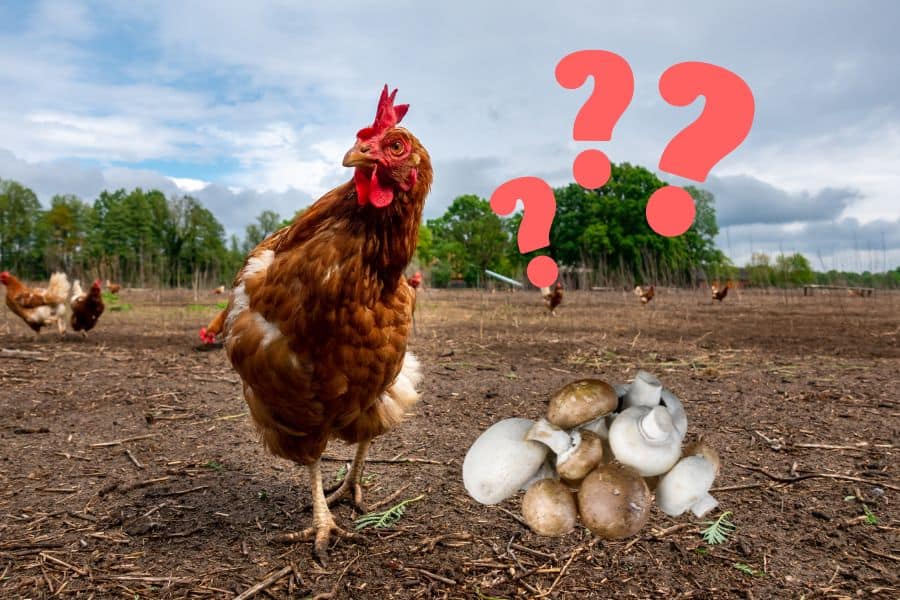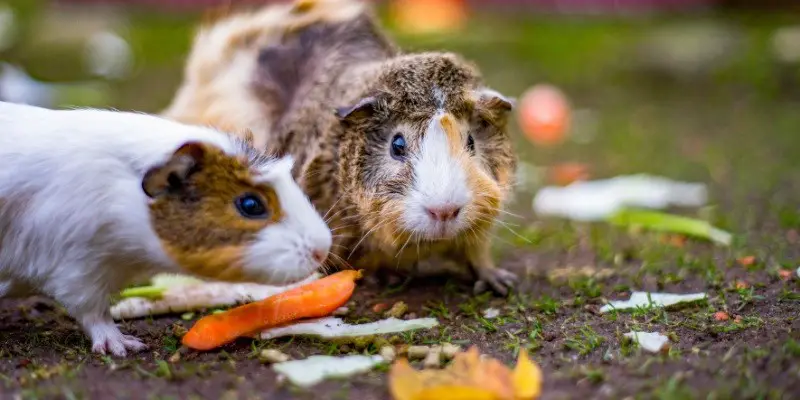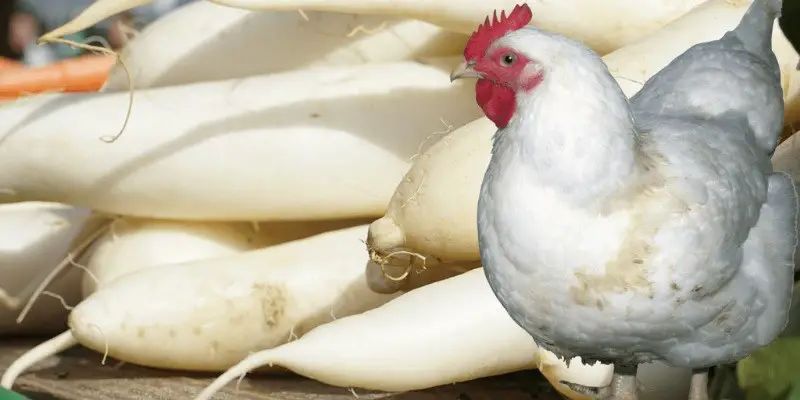Chickens can eat mushrooms, but only the safe and non-toxic varieties. It’s important to ensure that the mushrooms given to chickens are edible and do not pose a threat to their health.
With proper feeding practices, chickens can enjoy mushrooms without any harm. Giving them mushrooms from the market is safer than picking them in your yard or surroundings. While most mushrooms aren’t seriously toxic, there are a handful that could be deadly if consumed by chickens.
Therefore, it’s crucial to be cautious and knowledgeable about which mushrooms are safe for chickens to eat.
Can Chickens Eat Mushrooms Safely?
Mushrooms are a common delicacy enjoyed by humans, but can our feathered friends – chickens – safely consume them too? As with any new food, it’s important to understand the potential risks and benefits before introducing it into their diet. In this article, we will explore the importance of understanding chickens’ diet, the risks associated with the wrong diet, and common misconceptions about poultry feed.
Importance Of Chickens’ Diet
Chickens have specific dietary requirements that must be met to ensure their overall health and well-being. They require a balanced diet that includes a variety of nutrients such as carbohydrates, proteins, fats, vitamins, and minerals. Additionally, they need access to fresh water at all times.
Understanding the nutritional needs of chickens is crucial as it helps prevent nutrient deficiencies or imbalances that can lead to various health issues. Providing a well-balanced diet is not only essential for their overall health but also for optimal egg production, feather quality, and immune function.
Risks Associated With The Wrong Diet
Feeding chickens the wrong diet can have detrimental effects on their health. Chickens are naturally curious creatures and may consume foods that are harmful to them if given the opportunity. When it comes to mushrooms, the risks can be particularly severe. While some mushrooms are safe for chickens to eat, there are many species that are toxic and can be deadly.
It’s important to note that it can be challenging to accurately identify edible and non-edible mushrooms, especially for those without expertise in mycology. Feeding chickens the wrong type of mushroom can lead to symptoms such as diarrhea, vomiting, seizures, organ failure, and, in severe cases, death.
Common Misconceptions About Poultry Feed
There are several common misconceptions about what chickens can and cannot eat. One of the misconceptions is that chickens can safely consume all mushrooms. While it’s true that there are edible mushroom varieties that chickens can safely enjoy, it’s crucial to ensure that only known safe species are provided.
Another misconception is that chickens can eat onions. Onions contain a toxin called thiosulphate that can destroy red blood cells. Feeding onions to chickens in excessive amounts can lead to jaundice, anemia, or even death. Additionally, some claim that onions can taint the taste of eggs.
It’s important to debunk these misconceptions and educate ourselves about what is safe and beneficial for our chickens’ diet.
Overall, it’s essential to prioritize our chickens’ health and well-being by providing them with a proper, balanced diet. While mushrooms can be a potentially safe and nutritious addition to their diet, it’s crucial to consult with an expert or do thorough research to ensure the mushrooms offered are safe for consumption. Remember, when it comes to our chickens’ diet, knowledge and caution should always prevail.
Identifying Safe Varieties For Chickens
When it comes to feeding our beloved poultry, it’s essential to know what foods are safe and beneficial for them. This includes mushrooms, which can be a healthy addition to their diet if the right varieties are chosen. In this article, we will explore edible vs. poisonous mushrooms, the difference between commercially bought and wild mushrooms, and popular safe mushroom types for poultry.
Edible Vs. Poisonous Mushrooms
Before we delve into which mushrooms are safe for chickens, it’s crucial to understand the difference between edible and poisonous varieties. Edible mushrooms are safe for consumption and provide essential nutrients, such as vitamins and minerals, for chickens. On the other hand, poisonous mushrooms can be toxic and even fatal if ingested by chickens. It’s vital to be able to distinguish between the two to ensure the well-being of our feathered friends.
Commercially Bought Vs. Wild Mushrooms
When it comes to sourcing mushrooms for our chickens, we have two primary options: commercially bought or wild mushrooms. Commercially bought mushrooms are widely available in grocery stores and are typically safe for chickens to consume. However, it’s important to avoid seasoning or cooking them with ingredients that may be harmful to poultry, such as onions or garlic.
On the other hand, wild mushrooms can be a riskier choice. While some wild mushrooms are safe for chickens, many varieties can be poisonous. It takes expertise in mycology to accurately identify safe wild mushrooms for poultry consumption. Therefore, it’s generally recommended to stick to commercially bought mushrooms to ensure the safety of our chickens.
Popular Safe Mushroom Types For Poultry
Now that we understand the difference between edible and poisonous mushrooms and the risks associated with wild mushrooms, let’s explore some popular safe mushroom types for chickens:
- Chicken of the Woods: This mushroom is not only safe for chickens but also commonly enjoyed by them. It has a meaty texture and can be a nutritious addition to their diet.
- Cooked Portobello: While raw Portobello mushrooms can be harmful to chickens due to their tough texture, cooked Portobello mushrooms can be a tasty treat. Ensure they are cooked without any harmful seasonings or additives.
- Lion’s Mane: This fluffy-looking mushroom is safe for chickens and can provide them with some unique dietary variety.
- Chestnut Mushrooms: Another safe and nutritious option for chickens, chestnut mushrooms can be included in their diet to provide a range of flavors and textures.
Remember, always introduce new foods gradually into your chickens’ diet and observe their response to ensure they take well to the addition of mushrooms. By selecting the right varieties and being cautious about their source, we can provide our chickens with a safe and enjoyable culinary experience.
Preparing Mushrooms For Chickens
Mushrooms can be a nutritious addition to a chicken’s diet when prepared properly. However, not all mushroom species are safe for chickens to consume. It is important to know how to clean, cook, and serve mushrooms to ensure the health and safety of your flock. In this section, we will discuss the cleaning and cooking methods, cutting sizes, feeding frequency, and monitoring reactions to new food items when it comes to preparing mushrooms for chickens.
Cleaning And Cooking Methods
Before feeding mushrooms to chickens, it is essential to clean them thoroughly to remove any dirt or pesticide residue. Follow these steps to clean mushrooms for your flock:
- Wipe off any visible dirt or debris using a damp cloth or paper towel.
- Trim the stems if they are tough or woody.
- Rinse the mushrooms under cold running water to remove any remaining dirt.
- Pat dry with a clean towel or let them air dry.
Once the mushrooms are clean, they can be cooked using various methods. Some safe cooking methods for chickens include:
- Sautéing in a small amount of olive oil or butter.
- Baking in the oven with a little salt and pepper.
- Boiling or steaming until tender.
Remember to never season mushrooms with ingredients that are harmful to chickens, such as salt, garlic, or onions.
Cutting Sizes And Feeding Frequency
When it comes to serving mushrooms to chickens, it is important to cut them into small, bite-sized pieces. This makes it easier for chickens to eat and digest. Aim for approximately 1-2 cm (0.4-0.8 inches) in diameter when cutting the mushrooms.
As for the feeding frequency, mushrooms should be considered a treat and not a staple in a chicken’s diet. They can be given to chickens once or twice a week in moderate amounts. Always monitor your chickens’ reactions and adjust the feeding frequency accordingly.
Monitoring Reactions To New Food Items
When introducing any new food item, including mushrooms, to your chickens’ diet, it is important to monitor their reactions. Some chickens may have allergies or sensitivities to certain foods. Watch for any signs of digestive upset, such as diarrhea or unusual behavior, after feeding mushrooms to your flock.
If your chickens exhibit any negative reactions, discontinue feeding mushrooms immediately and consult a poultry veterinarian for further guidance.
Nutrition And Benefits Of Mushrooms For Chickens
Chickens can safely eat mushrooms as long as they are edible and not poisonous. Feeding them the right kind of mushrooms can offer nutritional benefits and keep them healthy. However, it is important to ensure that the mushrooms are safe for consumption and not toxic to the chickens.
Nutritional Components Of Mushrooms
Mushrooms are not only a delicious addition to human meals but can also provide nutritional benefits for chickens. They are a good source of various vitamins, minerals, and other important nutrients. Here are some key nutritional components of mushrooms that can positively impact a chicken’s diet:
- Protein: Mushrooms contain a decent amount of protein, which is essential for muscle development and growth in chickens.
- Fiber: Mushrooms are rich in dietary fiber, promoting proper digestion and preventing digestive issues in chickens.
- B-Vitamins: Mushrooms are a natural source of B-vitamins, including thiamine, riboflavin, and niacin, which play a vital role in metabolic processes and overall vitality of chickens.
- Antioxidants: Mushrooms are packed with antioxidants like selenium and ergothioneine, which help boost the immune system and protect chickens against oxidative stress.
Health Benefits For A Chicken’s Diet
Introducing mushrooms into a chicken’s diet can provide several health benefits due to their nutritional composition. Including mushrooms in their meals can:
- Boost Immunity: The presence of antioxidants in mushrooms strengthens the immune system, helping chickens fight off infections and diseases.
- Promote Healthy Digestion: The fiber content in mushrooms aids in smooth digestion and prevents digestive problems in chickens.
- Support Muscle Growth: The protein content in mushrooms contributes to muscle development and overall growth in chickens, ensuring they are healthy and strong.
- Provide Essential Nutrients: Mushrooms offer various vitamins and minerals that are essential for maintaining optimal health in chickens.
Limitations And Cautions When Feeding Mushrooms
While mushrooms can be beneficial for chickens, it is important to exercise caution and keep the following limitations in mind:
- Mushroom Species: Not all mushroom species are safe for chickens. Always ensure that the mushrooms you provide are non-toxic and safe for consumption.
- Moderation: While mushrooms can be a healthy addition to a chicken’s diet, it is important not to overfeed them. Moderation is key to maintaining a balanced and nutritious diet for chickens.
- Observation: When introducing mushrooms to your chicken’s diet, closely observe their behavior and any signs of discomfort or adverse reactions. If any negative symptoms occur, discontinue feeding mushrooms immediately.
By considering these guidelines and implementing the necessary precautions, you can safely incorporate mushrooms into your chicken’s diet, providing them with nutritional benefits that contribute to their overall health and well-being.
Incorporating Mushrooms Into Chickens’ Diet
Chickens are known to have diverse diets, consisting of various grains, fruits, and vegetables. However, you may wonder whether it is safe to include mushrooms in their diet. The good news is that chickens can indeed eat mushrooms, but it is essential to exercise caution and be mindful of the types of mushrooms you offer them.
To ensure optimal health and well-being, it is crucial to balance the mushroom inclusion with other dietary needs of chickens. While mushrooms offer several nutritional benefits, they should not replace the essential elements in their diet. For example, chickens primarily rely on a high-protein diet, so combining mushrooms with protein-rich feeds, such as bugs or seeds, is ideal.
Mushrooms can be incorporated into chickens’ diet through various meal plans. Here are some examples:
Meal Plan 1: Mushroom And Grain Mix
- 1 cup of cooked rice or quinoa
- 1/2 cup of chopped mushrooms (e.g., Portobello or white mushrooms)
- 1/4 cup of finely chopped greens (e.g., spinach or kale)
- 1 tablespoon of olive oil
- 1/2 teaspoon of poultry feed supplement
Meal Plan 2: Mushroom And Vegetable Medley
- 1 cup of mixed vegetables (e.g., carrots, bell peppers, and zucchini)
- 1/2 cup of sliced mushrooms (e.g., cremini or shiitake mushrooms)
- 1/4 cup of fresh herbs (e.g., parsley or basil)
- 1 tablespoon of melted coconut oil
- 1/2 teaspoon of calcium supplement
Transitioning chickens to a mushroom-inclusive diet requires careful consideration. Here are some tips to ensure a smooth transition:
- Start with small amounts: Begin by introducing small amounts of mushrooms into their regular feed and gradually increase the quantity over time.
- Observe their reaction: Monitor how your chickens respond to the mushrooms. If they exhibit any signs of discomfort or digestive issues, consult a veterinarian.
- Offer a variety of mushrooms: Different mushrooms offer unique flavors and nutritional profiles. Mix various types to provide a well-rounded diet.
- Ensure proper cooking: Raw mushrooms may be difficult for chickens to digest. Consider cooking or slightly sautéing them before serving to enhance digestibility and taste.
- Remove poisonous mushrooms: Do thorough research on mushroom varieties to avoid feeding your chickens any poisonous species that may be present in your yard or surroundings.
Potential Risks And Toxicity Concerns
While chickens can safely enjoy a variety of foods, it is important to be cautious when it comes to mushrooms. Not all mushroom species are safe for chickens to consume, and some can even be highly toxic. In this section, we will explore the potential risks and toxicity concerns associated with feeding mushrooms to chickens.
Toxic Mushroom Species To Avoid
There are several mushroom species that are known to be toxic to both humans and animals, including chickens. It is crucial to familiarize yourself with these species to keep your flock safe. Here are some toxic mushroom species that chickens should avoid:
| Mushroom Species | Toxicity Level |
|---|---|
| Amanita phalloides (Death Cap) | Extremely toxic; can be fatal |
| Amanita muscaria (Fly Agaric) | Highly toxic; can cause severe symptoms |
| Galerina marginata (Autumn Skullcap) | Highly toxic; can cause liver damage |
| Conocybe filaris (Conocybe Mushroom) | Highly toxic; can cause organ failure |
These are just a few examples of the toxic mushroom species that chickens should avoid. It is recommended to consult with a mycologist or a veterinarian who specializes in poultry health to identify any potentially toxic mushrooms in your area.
Detecting Symptoms Of Mushroom Poisoning
If your chickens accidentally consume toxic mushrooms, it is crucial to be able to identify the symptoms of mushroom poisoning. Here are some common signs to watch out for:
- Loss of appetite
- Diarrhea
- Lethargy or weakness
- Difficulty breathing
- Seizures or tremors
- Jaundice (yellowing of the skin or eyes)
It is important to note that symptoms can vary depending on the type of mushroom ingested and the amount consumed. If you notice any of these symptoms or suspect mushroom poisoning, seek immediate veterinary assistance.
Preventive Measures And Immediate Actions
To ensure the safety of your chickens, it is best to prevent them from accessing mushrooms in their environment altogether. Here are some preventive measures:
- Regularly inspect your chicken’s foraging areas for any mushroom growth.
- Remove any mushrooms found and dispose of them properly to prevent accidental consumption.
- Secure your chicken’s coop and run to prevent wild mushrooms from growing near their living space.
In the unfortunate event that your chickens do accidentally consume toxic mushrooms, it is crucial to take immediate action:
- Remove any access to the remaining mushrooms to prevent further consumption.
- Isolate the affected chicken(s) from the rest of the flock to monitor their symptoms closely.
- Seek veterinary assistance immediately to discuss the situation and follow their guidance for treatment.
Remember, prevention is key when it comes to keeping your flock safe from potential mushroom toxicity. With proper knowledge and precautions, you can ensure that your chickens stay healthy and happy.
Responding To Accidental Ingestions
Chickens should not eat mushrooms, as not all mushroom species are safe for them. It’s best to avoid feeding chickens mushrooms, as some species can be toxic and harmful to their health. Stick to a diet that keeps them healthy and happy.
Accidents happen, and sometimes chickens may accidentally ingest mushrooms while foraging in the yard. As a responsible chicken owner, it’s crucial to know how to respond in these situations. Prompt action can help prevent any potential harm to your feathered friends. In this section, we will discuss the procedures after suspected intake, long-term health monitoring, and creating a safe foraging environment.
Procedures After Suspected Intake
If you suspect that your chickens have consumed mushrooms, there are a few steps you can take to minimize any potential risks. It’s important to remember that not all mushrooms are safe for chickens, and some can be toxic or even deadly. Here are some recommended procedures to follow:
1. Identify the mushroom: Take a closer look at the mushroom your chickens may have ingested and, if possible, try to identify its species. This information will enable you to assess the potential toxicity of the mushroom and determine the appropriate course of action.
2. Contact a veterinarian: It’s always a good idea to consult a veterinarian immediately after suspecting mushroom ingestion. They can provide professional advice based on the specific mushroom species and your chickens’ symptoms, if any.
3. Isolate the affected chickens: If you notice any symptoms of illness or toxicity in your chickens, it is crucial to isolate them from the rest of the flock. This will prevent the potential spread of any toxins and allow for focused care and monitoring.
Long-term Health Monitoring
After accidental ingestion of mushrooms, it’s essential to monitor your chickens’ health in the long term. This will help ensure their well-being and enable you to detect any potential complications that may arise. Here are some guidelines for long-term health monitoring:
1. Observe their behavior: Keep a close eye on your chickens, and monitor their behavior for any changes. Look out for signs such as lethargy, loss of appetite, diarrhea, or abnormal feathering. These could indicate underlying health issues caused by mushroom ingestion.
2. Regular health checks: Schedule regular health checks with a veterinarian to assess your chickens’ overall well-being and identify any potential health concerns. A veterinarian can provide guidance on appropriate tests or treatments to ensure the long-term health of your chickens.
3. Maintain a balanced diet: A balanced diet is essential to support your chickens’ immune system and overall health. Ensure they have access to nutritious food and clean water at all times. Additionally, consider incorporating supplements recommended by a veterinarian to support their recovery and strengthen their immune system.
Creating A Safe Foraging Environment
Prevention is always better than cure. To minimize the chances of accidental mushroom ingestion, it’s crucial to create a safe foraging environment for your chickens. Follow these recommendations:
1. Clear the yard: Regularly check your yard for any mushrooms and promptly remove them. This will help eliminate any potential mushroom hazards and reduce the risk of accidental ingestion.
2. Educate yourself: Familiarize yourself with local mushroom species that are toxic to chickens. This knowledge will enable you to identify and remove any hazardous mushrooms promptly.
3. Provide alternative foraging options: To distract your chickens from potentially harmful mushrooms, provide alternative foraging options. Scatter safe treats, such as vegetables or fruits, in designated foraging areas to encourage them to focus on these instead.
By following these procedures after suspected intake, ensuring long-term health monitoring, and creating a safe foraging environment, you can help protect your chickens from the potential dangers of accidental mushroom ingestion. Remember, it’s always better to be proactive and prevent these situations from occurring in the first place.

Credit: www.theeverydaymomlife.com
Frequently Asked Questions On Can Chickens Eat Mushrooms?
Can Chickens Eat Onions Or Mushrooms?
Chickens should not eat onions because they contain a toxin that can harm them. On the other hand, chickens can safely eat mushrooms as long as the species is not poisonous. It’s best to purchase mushrooms from the market rather than forage for them in your yard.
Can Chickens Eat Mushrooms From The Yard?
Chickens should not eat mushrooms growing in the yard as some species can be toxic to them.
What Types Of Mushrooms Are Safe For Chickens To Eat?
Chickens can safely eat certain types of mushrooms, such as chicken of the woods, portobello, lion’s mane, and chestnut mushrooms.
Can Chickens Eat Cooked Mushrooms?
Yes, chickens can eat cooked mushrooms as long as they are not seasoned or cooked with any harmful ingredients like garlic or onion.
Are Mushrooms Harmful To Chickens?
Not all mushrooms are harmful to chickens, but it’s important to only give them safe and edible mushroom species to prevent any health issues.
Will Eating Mushrooms Affect The Taste Of Eggs?
There is no scientific evidence to suggest that chickens eating mushrooms will affect the taste of their eggs.
Conclusion
To conclude, chickens can safely eat mushrooms as long as they are edible and not poisonous. It is important to only give them the safe kinds of mushrooms to ensure their health and well-being. While most mushrooms are not seriously toxic, there are a few that can be dangerous and deadly for chickens.
Therefore, it is best to avoid wild mushrooms and stick to store-bought ones that are safe for human consumption. By following proper feeding practices, chickens can enjoy the occasional mushroom treat without any harm.
Last Updated on April 23, 2025 by Pauline G. Carter




